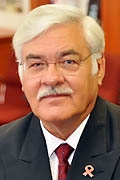Latest News Archive
Please select Category, Year, and then Month to display items
06 April 2018
Photo Rulanzen Martin
 From the left: Dr Thulisile Mphambukeli, leader of the BRICS research team that is exploring the political economy of water and food security, and her research partner, Dr Victor Okorie.
From the left: Dr Thulisile Mphambukeli, leader of the BRICS research team that is exploring the political economy of water and food security, and her research partner, Dr Victor Okorie.
A Brazil, Russia, India, China and South Africa (BRICS) delegation is to hold the 10th Annual BRICS Summit in the last week of May 2018 in Johannesburg. Dr Thulisile Mphambukeli, leader of the University of the Free State (UFS) research team alongside Dr Victor Okorie from the Department of Urban and Regional Planning, in collaboration with Prof Lere Amusan of North-West University, will ensure that water and food security is a prominent feature on the gathering’s agenda.
First, the project titled: “Exploring the political economy of water and food security nexus in BRICS and Africa” will debut at the National Institute for the Humanities and Social Sciences BRICS Think Tank Forum”.
According to Dr Mphambukeli, the key to water security is attitudinal change by means of education and conscientisation. This, she is adamant about, holds the potential to drive behavioural adjustments in the way society interacts with water.
Genetic and social approaches
Dr Okorie asserts that if strides towards reducing the demand for water were to be made, research efforts should be geared towards effecting changes at DNA level. Meaning we need to explore waterwise ways that enable crops and animals to thrive optimally.
The project also looks at social dimensions of water such as flushing a toilet. “Research activities on redesigning toilets, especially the urinal, where more than nine litres of water are used to flush less than one cubic centimetre of urine, are timely in the context of managing water and the food nexus crises,” said Dr Okorie.
Combining the genetic and social approaches would allow us to produce more with a smaller water footprint. This can be made possible by implementing precision agriculture which is about estimating and applying exact quantities of water and nutrients needed for the production of crops or the raising of livestock.
Paradigm shifting policies
Prof Amusan said the team intended to propose functional solutions that take the quality of water into consideration. Equitable production and distribution of water depends on endorsing policies of co-production between citizens, governments and the public sector. BRICS member states mutually consider water and food security as an issue of paramount significance, hence its feature on this prestigious summit’s agenda.
UFS academic joins an elite league of achievers
2010-04-14
 |
| Prof. Dingie van Rensburg |
|
Prof. Dingie van Rensburg, Director of the Centre for Health Systems Research & Development at the University of the Free State (UFS), has joined an elite list of a only few distinguished individuals who have been awarded honorary doctorates by the University of Antwerp (UA) in Belgium.
He is only the third South African to be honoured in this way by the UA, following in the footsteps of Constitutional Court Judge Albie Sachs (2000) and former State President, Nelson Mandela (2004).
He is the first social scientist from South Africa to receive this honorary doctorate from the UA – the highest academic distinction of that university. The university has previously only awarded three honorary doctorates to social scientists: Prof. Raymond Boudon, sociologist at the University of Paris-Sorbonne (1995); Prof. Robert Putman, political scientist at Harvard University (2000); and Prof. John Nash (of A Beautiful Mind fame), mathematician and economist at Massachusetts Institute of Technology (MIT) and Princeton.
The award ceremony will take place on 29 April 2010 in Antwerp.
Prof. Van Rensburg has authored, co-authored and was editor of many books/volumes, chapters in books, monographs, research reports and articles in scientific journals. He has also presented and co-presented at numerous national and international conferences; and supervised a significant number of master’s, doctoral and post-doctoral students.
In his 17 years as director of the Centre he has initiated, managed and led approximately 50 research and development projects, several of them large and long-term projects, and many of an inter-institutional and multidisciplinary nature.
In 2002 he became an NRF-rated researcher and in 2007 his rating as an established researcher was renewed. In the past two decades he received several research grants simultaneously from both the National Research Foundation and the Medical Research Foundation of South Africa, mostly for projects on Tuberculosis, HIV/Aids and antiretroviral treatment.
Prof Van Rensburg holds membership of both the Suid-Afrikaanse Akademie vir Wetenskap en Kuns and the Academy for Science of South Africa; he also served for varying periods on the Councils of both these academies. He was also a member of various health bodies of the Free State Province and the National Science and Technology Forum.
Media Release
Issued by: Mangaliso Radebe
Assistant Director: Media Liaison
Tel: 051 401 2828
Cell: 078 460 3320
E-mail: radebemt@ufs.ac.za
14 April 2010
|